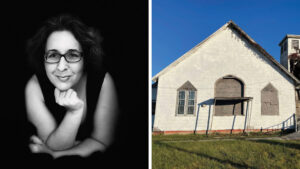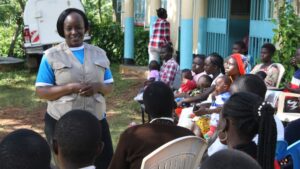David Ben Moshe desperately wants to be an Israeli citizen. But so far, the Israeli government refuses to grant his request.
A Frederick native who relocated to Baltimore for several years and graduated from Towson University with a degree in exercise science, Ben Moshe, 33, now lives in the western Jerusalem neighborhood of Motza. He discovered Judaism nearly a decade ago while incarcerated in federal prison for 30 months on drug and firearms charges.
After his release in 2012, Ben Moshe — who was born David Bonett and is Black and raised Christian — converted to Judaism three years ago through B’nai Israel Synagogue’s Rabbi Etan Mintz and married under Orthodox law in Israel. He applied for citizenship under Israel’s Law of Return two-and-a-half years ago and so far has been denied.
Ben Moshe, who works a personal trainer and fitness coach, won a social justice fellowship from the Pardes Institute for Jewish Studies in Jerusalem and is engaged in myriad social justice causes, including teaching exercise activities to children with special needs.
Last week, Israel’s Interior Ministry extended Ben Moshe’s visa for another year but declined to grant him citizenship, even though he is married to an Israeli citizen, Tamar Gresser Ben Moshe, who grew up in Beersheva, and has an Israeli-born baby daughter.
“The applicant has a criminal history, and the reason that he has only been given a residency permit stems from these reasons and no other ones,” a spokesman for Israel’s Population and Immigration Authority of the Interior Ministry said in a statement, according to the Jerusalem Post.
Jmore recently spoke via email to Ben Moshe, a former community connector for the Jewish Community Center of Greater Baltimore’s Charm City Tribe group, about his citizenship case and its impact on his life.
Jmore: Your case is now getting a lot of attention in the Jewish media and elsewhere. How do you feel about the publicity?
Ben Moshe: I am happy about the publicity, [but] it makes me uncomfortable. Happy because after the way the Israeli government has — and continues — to mistreat me, it is clear that without some kind of intervention, this nightmare will never end. Hopefully, this media attention is enough to bring this painful chapter of my life to a happy ending.
Uncomfortable for two reasons. One is that it is a constant reminder that I can never expect to receive fair treatment in my life. Two is that in my opinion, Israel is often unfairly painted as a racist and discriminatory place, and I don’t like making Israel look bad.
But unfortunately, the Ministry of the Interior has chosen to embarrass Israel in the way that they have handled my case.
Why do you feel the government refuses to grant citizenship to you?
Because they refuse to look at me as a human being. To them, I am a Black convert with a criminal record instead of a person who can bring value and diversity to Israeli society.
Do you truly feel that racism or discrimination against people with criminal records play a part in their refusal?
It is clearly discrimination. Despite the fact that I clearly met the requirements of being a Jew for the purpose of aliyah, they have written me three letters stating the opposite. When we demanded clarification as to why they would make such a statement, I was simply ignored.
By law, they had to answer me within 45 days and give specifics. Instead, they took a year-and-a-half and still refused to give a single reason as to why my conversion was unacceptable. Meanwhile, they gave verbal statements to the media and the Jewish Agency, the ministry stating that my conversion was fine and my criminal record was the problem.
It is unjust to put in writing to me that my conversion is a problem, while telling everyone else that I am a criminal. People with a criminal history are human beings as well, something that I would expect the Ministry of the Interior to understand.
Do you know other African-Americans in Israel in this situation?
No, but I know many people of color who had extra problems and hurdles moving to Israel. Indians, Ugandans and Ethiopians, to name a few.
What’s it been like to fight this battle for 2½ years?
Stressful on so many levels. If I could get a response to anything in the time frames required by law, this would be solved already. But I have never gotten a response in less than nine months.
They can ignore the law and the written policy with no consequences. But policy can be used to prevent me from moving toward citizenship, no matter how ridiculous. For example, my wife is registered as married because we got married in the state of Israel. I, however, am on a visa based on being in an ‘unmarried relationship’ because our first marriage was in the state of Israel. All Israeli marriages are invalid for non-citizen status questions because they are not ‘civil’ marriages. We flew to the U.S. to get a civil marriage, only to find out we can’t use it to register me as married to my wife, because she is already registered as married to me. Isn’t that the definition of monogamy?
It is like playing a game where the other side made all the rules but only follows the rules when it helps them, and ignores the rules when they are in your favor. The only word to describe the situation is Kafkaesque.
What attracted you to Judaism while in prison?
Learning [the rabbinic] commentators. It is very special to have a religion that celebrates and highlights different opinions and traditions, even when they contradict.
What made you decide to make aliyah?
A love for the state of Israel and the Jewish people. After experiencing discrimination in the U.S. that left me with my business closed and lease canceled and nothing to do, I knew it was time to come to Israel. I discuss that incident in detail in this blog post.
What impact has your non-citizenship status had on your family?
My wife has been incredibly supportive. But it is impossible to lead lives close to normal when we have to live like this. We have had many weeks where we spent 20 hours in government offices, not including the time spent gathering documents, writing letters and other related tasks. How are you supposed to work and raise a family when that keeps happening and you never know when it will or how long it will last?
All we want to do is raise a Jewish family in the state of Israel. We already have one wonderful daughter and are expecting our first son in February. בע”ה [with God’s help], we will have many more. The state of Israel should be supporting the endeavor for us and all Jews in the world who want to make their homes here. You could even say it is the entire reason for the existence of the state.
Do you fear being deported?
Multiple times, the ministry has forced me into being in the country illegally without a visa, while verbally claiming that it wasn’t illegal and I would be fine. During the first occasion this happened, I was detained and explicitly threatened with deportation.
Are you optimistic that things will work out in the end?
Yes, but pessimistic about how long it will take to get to the end. Almost three years into the process, we have made almost no progress. I have an Orthodox conversion, a marriage through the Israeli Rabbinate and a civil marriage, but I still have the letters stating my conversion is invalid with no explanation and can only stay in the country because I have a visa based on being in an unmarried relationship.
What would you say to Baltimore Jews and Israelis alike about your plight right now?
You are the only ones who can stop this madness. It is easy to believe that the written law is what gives you your rights. It isn’t. The government can choose to change or ignore the law at any time.
It is only when individuals stand up and demand justice that the government can be held accountable. Please stand up and help me.





